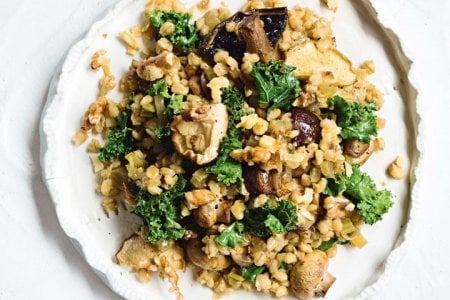How do you stay healthy when the cost of living is going up?
When prices of meat and fresh fruit and vegetables are skyrocketing, and other expenses such as petrol and utility bills are also rising, how do you maintain a healthy lifestyle? It’s not impossible, but you might find it difficult to work with a limited budget and exert more effort to maximise your money.
Thankfully, the internet is a great resource for ‘hacks’ (like the SDC, hint, hint) so that you can remain healthy even amidst inflation.
One Aussie turned to the OzBargain community for tips – we’ve collated some of the answers that might help you, too.
Go plant-based
‘Contrary to popular smear opinion, eating plant-based/vegan can be super cheap – just don't go for processed stuff,’ an OzBargain member said.
There are many misconceptions about going plant-based, including not having enough protein and the diet being restrictive, which have been debunked by science. In fact, plants can be great sources of protein, and the variety of options allows households to be creative with food.
Soy products, quinoa, and beans are all complete sources of protein. Tofu, lentils, and whole grains are also great, cheap protein options.
There are also many dishes possible using greens. Taste.com has recommended recipes if you need ideas, such as Vietnamese pancakes and mushroom, kale and barley pilaf.
Make natural yoghurt
There are many benefits to eating yoghurt. Consumed by humans for centuries, it is rich in nutrients such as protein and magnesium, as well as vitamins B and D. Studies also show that yoghurt helps in reducing the risk for heart diseases, maintaining a healthy weight, and strengthening your immune system.
It is convenient to buy a tub of ready-to-eat yoghurt, but some Aussies have started making their own to get more value for their money. There are claims that you can save as much as $150 a year with homemade yoghurt. It takes time but it can taste just as great and give you more servings for a fraction of the price – even $153 less for a 19-week supply.
Check out this video to learn how to create your own yoghurt:
Grow your fruits and vegetables
If you have the backyard for it, you can start planting your food. OzBargain members have plenty of recommendations on what to grow.
A comment said: ‘Tomatoes are pretty easy and tolerate a wide variety of conditions so you’re nearly guaranteed to get some success with little effort.’
Another member commented: ‘We’ve been having great success with snow peas. Apparently, you can do okay year-round, but I think you have to get onto them quicker in summer. We have six vines on the go and get a couple of handfuls a day and have a succession of new vines coming through. Haven’t spent any money other than the seeds.’
‘Pumpkin and tomatoes are easy and we can always make full use of or give excess to friends,’ one Aussie shared.
‘Best bang for buck is growing leafy greens – rocket, bok choy, tatsoi, mustard, kale, chard, etc. and herbs. They are also the most nutritious,’ said another home grower.
Many Aussies have saved money this way. One woman on the Gold Coast claims she saves about $100 per fortnight growing her own food, but she also has a backyard the size of half a tennis court.
You can still benefit financially from planting fruits and vegetables. Check out this guide from Choice for tips on how to start your own vegetable garden.
Don’t have a backyard conducive to planting? Another suggestion on the thread is joining a community garden – there are hundreds around the country, either with membership or for free.

Locals are free to visit the Walyu Yarta Community Garden in the Adelaide Parklands for fresh produce. Credit: Candice Prosser/ABC
Eat seasonal produce
‘Don’t expect to eat the same fresh vegetables year round. Eat when they are in season,’ one comment on the OzBargain post said.
Buying seasonal produce lets you have tastier and fresher meals because the vegetables are grown and harvested under optimal conditions. They are usually cheaper too, owing to lower transport costs and greater supply.
Shop at Asian grocery stores
It might be convenient to head to Woolworths or Coles for your supplies, but you might miss out on great deals by skipping your local Asian stores.
‘If you do live next to any Asian groceries, check out their veggies, rice, etc. It'll be cheaper there compared to Coles,’ one member encouraged.
‘Most Asian butchers are also generally cheaper for mince and other cuts. Are you in Sydney? Eastwood has lots of cheaper grocers and butchers,’ another commenter said.
One more Aussie chimed in about its benefits: ‘We predominantly shop at our local Asian grocery. Chicken breast at the Asian grocery is $7/kg.’
You save money and help local businesses in the process, so it’s a win-win!
Buy frozen vegetables
Many shoppers opt for the fresher variety when grocery shopping. But if you’re strapped for cash, going for frozen vegetables can be just as good.
Frozen does not necessarily mean less healthy. Purva Gulyani, Accredited Practising Dietitian and spokesperson for Dietitians Australia, told SBS: ‘The truth is that frozen vegetables and fruits are picked when they are at the peak of their ripeness, and they are snap frozen within hours. In fact, some studies have shown that processed produce may have more antioxidants and vitamins than the fresh produce that’s been stored in your fridge for two or three days before being eaten.’
If you’re concerned about taste and texture, an OzBargain member has a tip: ‘Texture can be improved with an air fryer or the fan grill setting of your oven. Improve taste with some seasoning – paprika, black pepper, garlic, chicken salt, or even Vegeta (stock) powder.’
Do you have more tips on how to save but still be healthy in these financially trying times? Share your wisdom in the comments below!
Thankfully, the internet is a great resource for ‘hacks’ (like the SDC, hint, hint) so that you can remain healthy even amidst inflation.
One Aussie turned to the OzBargain community for tips – we’ve collated some of the answers that might help you, too.
Go plant-based
‘Contrary to popular smear opinion, eating plant-based/vegan can be super cheap – just don't go for processed stuff,’ an OzBargain member said.
There are many misconceptions about going plant-based, including not having enough protein and the diet being restrictive, which have been debunked by science. In fact, plants can be great sources of protein, and the variety of options allows households to be creative with food.
Soy products, quinoa, and beans are all complete sources of protein. Tofu, lentils, and whole grains are also great, cheap protein options.
There are also many dishes possible using greens. Taste.com has recommended recipes if you need ideas, such as Vietnamese pancakes and mushroom, kale and barley pilaf.
Make natural yoghurt
There are many benefits to eating yoghurt. Consumed by humans for centuries, it is rich in nutrients such as protein and magnesium, as well as vitamins B and D. Studies also show that yoghurt helps in reducing the risk for heart diseases, maintaining a healthy weight, and strengthening your immune system.
It is convenient to buy a tub of ready-to-eat yoghurt, but some Aussies have started making their own to get more value for their money. There are claims that you can save as much as $150 a year with homemade yoghurt. It takes time but it can taste just as great and give you more servings for a fraction of the price – even $153 less for a 19-week supply.
Check out this video to learn how to create your own yoghurt:
Grow your fruits and vegetables
If you have the backyard for it, you can start planting your food. OzBargain members have plenty of recommendations on what to grow.
A comment said: ‘Tomatoes are pretty easy and tolerate a wide variety of conditions so you’re nearly guaranteed to get some success with little effort.’
Another member commented: ‘We’ve been having great success with snow peas. Apparently, you can do okay year-round, but I think you have to get onto them quicker in summer. We have six vines on the go and get a couple of handfuls a day and have a succession of new vines coming through. Haven’t spent any money other than the seeds.’
‘Pumpkin and tomatoes are easy and we can always make full use of or give excess to friends,’ one Aussie shared.
‘Best bang for buck is growing leafy greens – rocket, bok choy, tatsoi, mustard, kale, chard, etc. and herbs. They are also the most nutritious,’ said another home grower.
Many Aussies have saved money this way. One woman on the Gold Coast claims she saves about $100 per fortnight growing her own food, but she also has a backyard the size of half a tennis court.
You can still benefit financially from planting fruits and vegetables. Check out this guide from Choice for tips on how to start your own vegetable garden.
Don’t have a backyard conducive to planting? Another suggestion on the thread is joining a community garden – there are hundreds around the country, either with membership or for free.

Locals are free to visit the Walyu Yarta Community Garden in the Adelaide Parklands for fresh produce. Credit: Candice Prosser/ABC
Eat seasonal produce
‘Don’t expect to eat the same fresh vegetables year round. Eat when they are in season,’ one comment on the OzBargain post said.
Buying seasonal produce lets you have tastier and fresher meals because the vegetables are grown and harvested under optimal conditions. They are usually cheaper too, owing to lower transport costs and greater supply.
Shop at Asian grocery stores
It might be convenient to head to Woolworths or Coles for your supplies, but you might miss out on great deals by skipping your local Asian stores.
‘If you do live next to any Asian groceries, check out their veggies, rice, etc. It'll be cheaper there compared to Coles,’ one member encouraged.
‘Most Asian butchers are also generally cheaper for mince and other cuts. Are you in Sydney? Eastwood has lots of cheaper grocers and butchers,’ another commenter said.
One more Aussie chimed in about its benefits: ‘We predominantly shop at our local Asian grocery. Chicken breast at the Asian grocery is $7/kg.’
You save money and help local businesses in the process, so it’s a win-win!
Buy frozen vegetables
Many shoppers opt for the fresher variety when grocery shopping. But if you’re strapped for cash, going for frozen vegetables can be just as good.
Frozen does not necessarily mean less healthy. Purva Gulyani, Accredited Practising Dietitian and spokesperson for Dietitians Australia, told SBS: ‘The truth is that frozen vegetables and fruits are picked when they are at the peak of their ripeness, and they are snap frozen within hours. In fact, some studies have shown that processed produce may have more antioxidants and vitamins than the fresh produce that’s been stored in your fridge for two or three days before being eaten.’
If you’re concerned about taste and texture, an OzBargain member has a tip: ‘Texture can be improved with an air fryer or the fan grill setting of your oven. Improve taste with some seasoning – paprika, black pepper, garlic, chicken salt, or even Vegeta (stock) powder.’
Do you have more tips on how to save but still be healthy in these financially trying times? Share your wisdom in the comments below!
Last edited:








